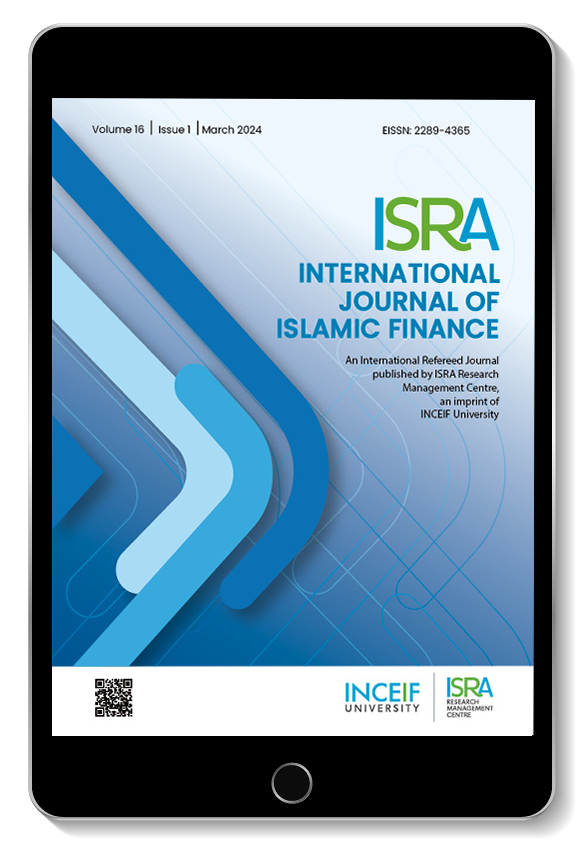千禧一代视角下的现金宗教基金——以印度尼西亚为例
IF 2.8
Q2 BUSINESS, FINANCE
引用次数: 23
摘要
本研究的目的是探讨印尼千禧一代对现金捐赠的认知和意愿水平。现金waqf因其灵活性在印度尼西亚获得了巨大的关注,特别是在2002年该国正式宣布现金waqf实践符合伊斯兰教法之后。千禧一代占印尼总人口的33.75%。因此,从印尼的角度分析现金流是至关重要的。这项研究为所有与加强印度尼西亚现金基金捐助有关的机构提供了重要的资料。设计/方法/方法在爪哇岛分发自结构问卷以收集数据。采用合适的统计工具对数据进行检验。此外,我们还与印尼不同相关机构的现金waqf专家进行了访谈后的实况调查,对现金waqf问题有了更深入的了解。调查结果显示,印尼千禧一代对现金短缺的意识很高。研究结果进一步揭示了样本人群对现金流的贡献意愿水平低于他们对现金流的意识水平。此外,现金waqf的推广必须侧重于让人们更深入地了解这一概念,以及它与其他类型的伊斯兰慈善事业有何不同。结果表明,该国的waqf受托人必须更加透明。此外,印尼Waqf董事会应实施更严格的规则来监督Waqf受托人。研究局限/启示本研究关注1980年至2000年出生的印尼穆斯林对现金流动的意愿和意识。作为一个穆斯林占多数的国家,人们会期望印尼在现金流通方面取得很大进展。通过解释印尼人对现金捐赠的意愿和意识,本研究有助于为未来的现金捐赠活动的捐助者设计适当的教育营销活动,以确保现金捐赠机构提供有效的服务。强调waf组织的透明性是可取的。这将增加nazhir (waqf受托人)的声誉,从而通过确保waqf现金的适当分配来提高waqf的国家份额。监管机构应该更严格地监督纳齐尔的行为。例如,它可以包括对waqf实体的定期评估。原创性/价值这项研究在本质上是原创性的;此前没有研究针对印尼千禧一代对现金流的看法。因此,本研究为政策制定者、从业者和研究者提供了宝贵的信息。本文章由计算机程序翻译,如有差异,请以英文原文为准。
Cash waqf from the millennials' perspective: a case of Indonesia
PurposeThe purpose of this study is to explore the awareness and willingness level of millennials in Indonesia toward cash waqf (cash endowment). Cash waqf has gained huge attention in Indonesia because of its flexibility, especially after officially announcing that cash waqf practices are sharia-compliant in 2002 in the country. Millennials comprise 33.75% of the total Indonesian population. Therefore, it is vital to analyze cash waqf from an Indonesian perspective. This study provides vital information for all institutions that are concerned with the enhancement of the cash waqf contributions in Indonesia.Design/methodology/approachSelf-structured questionnaires were distributed in Java Island to collect the data. The data were examined by employing suitable statistical tools. Besides, post-interview fact-finding was conducted with cash waqf experts from different related institutions in Indonesia to reach a more in-depth understanding about cash waqf issues.FindingsThe results depict a high level of awareness about cash waqf among millennials in Indonesia. The results further reveal a lower willingness level to contribute to cash waqf of the sample population as compared to their level of awareness about cash waqf. Moreover, cash waqf promotions must focus on delivering a deeper understanding about the concept and how it differs from other types of Islamic philanthropy. The results suggest that waqf trustees in the country must be more transparent. Moreover, the Indonesian Waqf Board should implement stricter rules to monitor waqf trustees.Research limitations/implicationsThis research concerns the willingness and awareness toward cash waqf among Indonesian Muslims who were born between 1980 and 2000.Practical implicationsAs a Muslim-majority country, one would expect Indonesia to make much progress in cash waqf. By providing an explanatory understanding of willingness and awareness of cash waqf among Indonesians, this research can be helpful in designing proper educative marketing campaigns for future endowers to cash waqf activities to ensure cash waqf institutions provide efficient services. It is advisable to emphasize the transparency of waqf organizations. This will add to the nazhir's (waqf trustee) reputation, thereby boosting waqf's national shares by ensuring a proper allocation of cash waqf. The regulator should be more strict in monitoring nazhir’s practices. For instance, it could include a periodic assessment of waqf entities.Originality/valueThis study is original in nature; there is no previous study that addresses the millennial’s perspective toward cash waqf in Indonesia. Hence, this study presents precious information for policy makers, practitioners and researchers.
求助全文
通过发布文献求助,成功后即可免费获取论文全文。
去求助
来源期刊

ISRA International Journal of Islamic Finance
BUSINESS, FINANCE-
CiteScore
3.40
自引率
17.40%
发文量
18
审稿时长
20 weeks
期刊介绍:
It is the aspiration of the editorial committee that IJIF achieves the highest rank in quality and substance. It is thus our aim that the journal be carried in the Thompson Reuters’ ISI and Scopus databases. By ensuring high standards in articles published in Islamic finance we ensure that further innovation and research is carried out and promoted in the Islamic finance industry and academia. IJIF publishes 2 issues per annum.
 求助内容:
求助内容: 应助结果提醒方式:
应助结果提醒方式:


